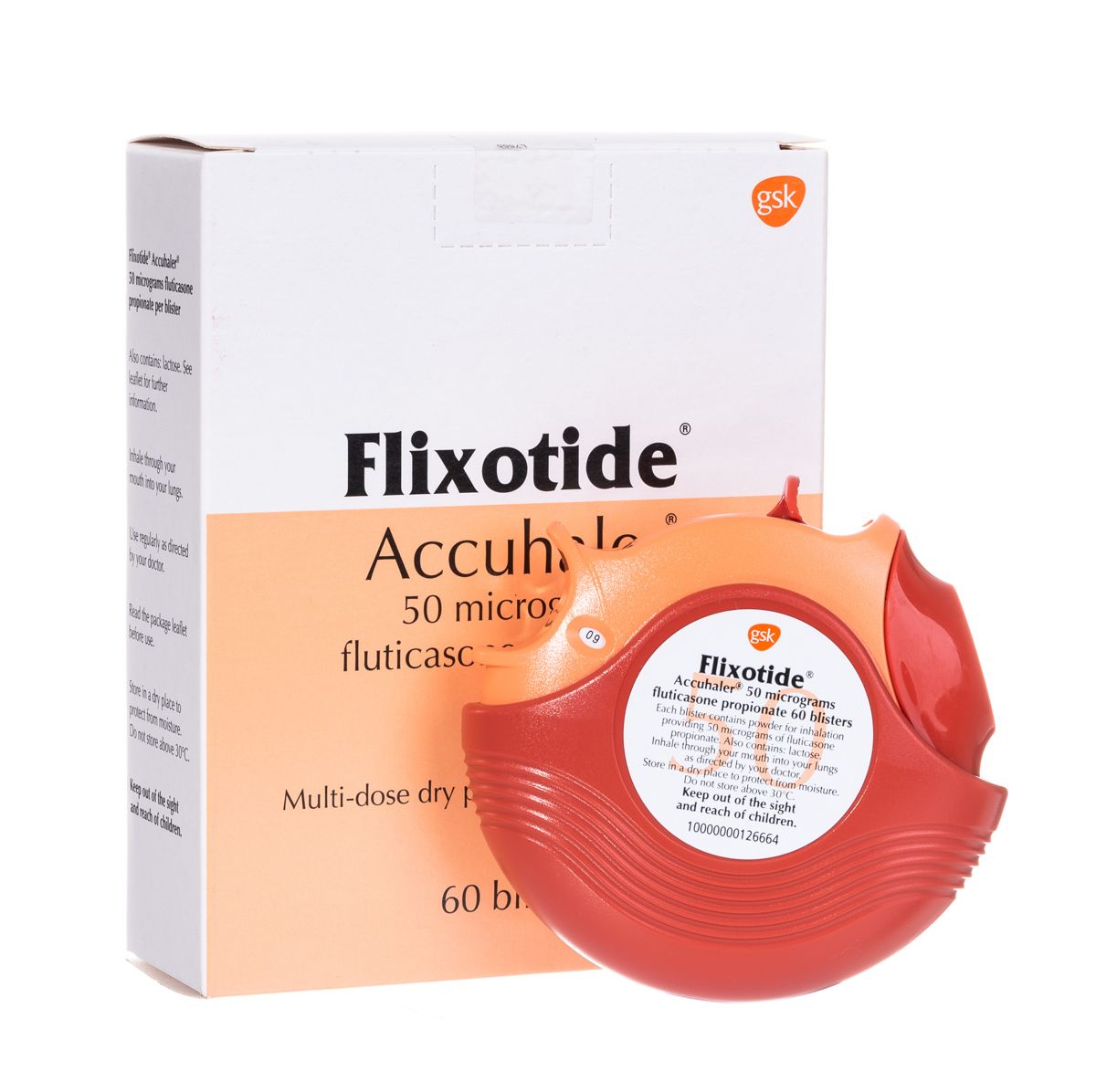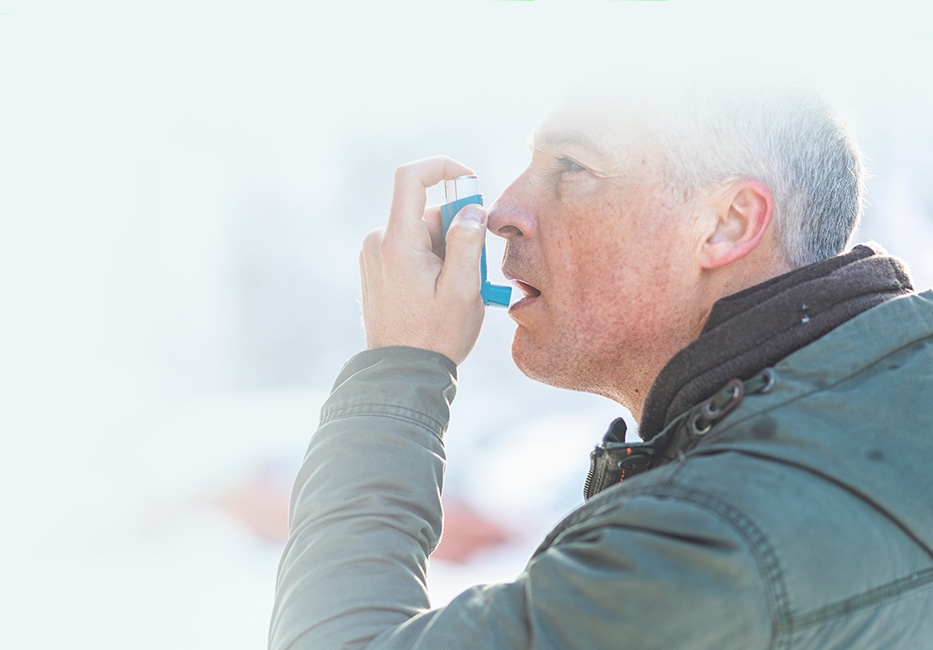1000mg NAD+ is now in Stock - Find out more about how to feel better, fast with NAD+ here.
- Home
- Chronic Conditions
- Asthma/COPD Treatment
Asthma/COPD Treatment
Breathe Easier With The Right Inhaler Treatment
Asthma and chronic obstructive pulmonary disease (COPD) are long-term respiratory conditions that affect the airways, causing symptoms such as wheezing, coughing, breathlessness and chest tightness. While these conditions are different, they both make breathing difficult and can be managed with the right medication. Asthma is typically caused by inflammation in the airways, making them overly sensitive to triggers. Although it cannot be cured, asthma can be effectively controlled with inhalers and other treatments to reduce symptoms and prevent flare-ups.
At UK Meds, you can request a wide range of asthma and COPD treatments online, including reliever and preventer inhalers. Simply complete a short health questionnaire and a registered prescriber will review your request. If approved, your treatment is delivered discreetly to your door. If you are experiencing an asthma attack or severe symptoms, call 999 or NHS 111 immediately and follow your asthma action plan. Do not use this service in an emergency.
Think you might have asthma? Take our "Do I Have Asthma?" quiz to learn more. You can also explore treatment options using our comparison tool.
More Information
Buy Asthma Inhalers
Can I Buy Asthma Treatment Online?
Yes, you can request asthma treatments online through UK Meds. We offer a range of inhalers and medications for both asthma and COPD, including reliever inhalers (blue inhalers commonly referred to as an 'asthma pump'), preventer inhalers, combination inhalers and inhaled corticosteroids. These treatments help manage symptoms such as wheezing, coughing and breathlessness.
To order, simply complete a quick online consultation. A registered prescriber will review your answers to ensure the medication is suitable for your health needs. If approved, your prescription is issued and your treatment is delivered directly to your door.
Can You Buy Asthma Inhalers Without a Prescription?
No, asthma inhalers cannot be bought over the counter in the UK. They are prescription-only medicines because the type and dosage must be tailored to your condition and medical history. This helps ensure safe and effective treatment.
At UK Meds, you can access prescription asthma treatments without needing a face-to-face GP appointment. If your consultation is approved, your inhaler is dispatched quickly and discreetly for home delivery.
Always speak to your GP or healthcare provider before starting a new asthma medication, especially if you're unsure about your symptoms or have other health conditions.
What is Asthma?
Asthma, also known as bronchial asthma, is a long-term respiratory condition where the airways become inflamed and narrowed (HSE, 2021). This makes it harder to breathe and can cause recurring symptoms that often begin in childhood.
Asthma symptoms can range from mild to severe and may come and go. They often get worse at night or early in the morning.
What are the symptoms of asthma?
Common signs of asthma include:
- Coughing: Often worse at night or first thing in the morning, which can disturb sleep.
- Chest tightness: A feeling of pressure or heaviness that can make it difficult to breathe.
- Wheezing: A whistling or rattling sound while breathing due to narrowed airways.
- Shortness of breath: Feeling like you can't fully exhale or get enough air.
What Triggers Asthma?
Asthma symptoms are often set off by common irritants known as triggers. These include:
- Dust, pollen, animal fur
- Smoke or air pollution
- Exercise or cold weather
- Strong smells such as perfume or cleaning products
Triggers inflame the airways and can lead to an asthma attack (Asthma and Lung UK, 2025; Health and Safety Executive, 2021). In rare cases, people may have a silent asthma attack, with no wheezing but symptoms like chest tightness, fast breathing, or blue lips. This is a medical emergency and needs urgent attention.
Why Does Asthma Happen?
The exact cause of asthma isn’t fully known, but both genetic and environmental factors play a role. You may be more likely to develop asthma if it runs in your family. Find out more about the link between asthma and genetics.
Goals for Managing Asthma
- Stay symptom-free during the day and night
- Prevent asthma attacks and flare-ups
- Keep lung function stable
- Stay active without limitations
- Use reliever inhalers like Salbutamol or Ventolin less often
How to Prevent Asthma Attacks
To reduce the risk of flare-ups, avoid known triggers. Stay indoors during high pollution days, avoid smoking and second-hand smoke, and reduce exposure to dust by cleaning with a damp cloth and washing bedding regularly in hot water. If possible, remove carpets to limit dust build-up.
Should I Avoid Pets?
If pets make your asthma worse, it may be best to avoid having them at home. Limit time spent in places with animals, and avoid strong scents like air fresheners, perfumes and paint that can worsen symptoms.
Types of Asthma
- Intermittent: Symptoms come and go
- Mild persistent: Symptoms occur more than twice a week
- Moderate persistent: Daily symptoms affect daily life
- Severe persistent: Frequent, intense symptoms requiring ongoing treatment
Other Classifications
- Allergic asthma: Triggered by allergens like pollen or dust
- Acute severe asthma: A life-threatening attack that doesn’t improve with usual treatment
- Brittle asthma: Rare and unpredictable, involving sudden or frequent severe attacks
What Does an Asthma Attack Feel Like?
- Persistent coughing, especially at night
- Chest tightness or wheezing
- Shortness of breath during activity or in cold weather
- Difficulty speaking during an attack
Mental Health and Asthma
Living with a chronic lung condition like asthma can impact mental health. It’s common for people with severe asthma or COPD to experience anxiety or depression due to the physical and emotional strain of managing their symptoms (Asthma + Lung UK, 2023).
Where Do Triggers Occur Most Often?
Understanding your environment can help reduce flare-ups. Triggers can vary depending on your location, from pet hair at home to pollution outside. Find out where asthma is most commonly triggered.
How is Asthma Diagnosed?
Asthma can’t be confirmed by symptoms alone, as not everyone experiences the same signs. To make a diagnosis, your doctor will look at how often you have symptoms, how they affect your daily life and what treatments may be needed. A combination of medical history and lung tests helps confirm the condition and shape a personalised treatment plan using reliever inhalers (like Salbutamol or Ventolin) and preventers if needed.
What Tests Are Used to Diagnose Asthma?
- Spirometry: Measures how much air you can breathe in and how quickly you can exhale.
- Lung reactivity tests: Checks how your airways respond to triggers. Allergy tests may also be used to identify specific triggers.
Asthma symptoms can vary in severity and change over time, even in the same person, which is why accurate testing is important.
How Often Should You Be Monitored?
When starting treatment, follow-up appointments are usually recommended every 2 to 6 weeks. Once your asthma is well controlled, annual check-ups are generally enough to keep symptoms under review.
What is COPD?
COPD (chronic obstructive pulmonary disease) is a long-term lung condition that makes breathing difficult. It includes diseases like emphysema and chronic bronchitis. While asthma symptoms can come and go, COPD gets worse over time. This progressive damage is often caused by smoking.
In fact, nearly 90% of COPD-related deaths are linked to smoking (GOV.UK, 2015).
Doctors often use a COPD test, called a spirometry test, to check how well your lungs are working. If you have a constant cough or ongoing breathlessness, your GP may suggest this test to look for blocked airways or reduced lung capacity.
A key part of diagnosing COPD is through a COPD test, usually a spirometry test, which measures how well your lungs are working. If you're experiencing ongoing breathlessness or a persistent cough, your doctor may recommend this test to check for signs of airway obstruction or reduced lung function.
COPD Symptoms
Typically, the symptoms of COPD are similar to asthma but tend to be more constant and progressive:
- Inflamed airways
- Excessive mucus
- Damaged alveolar (air sacs in the lungs)
We can trace the cause backwards more easily though (Spencer & Kreiger, 2013), as it’s usually down to cigarette smoke in developed countries (WHO, 2023), and pollution in developing ones (Brakema et al, 2019).
How Can I Treat Asthma and COPD?
Asthma and COPD Inhalers
Asthma and COPD share similar symptoms, so treatments often overlap. Inhalers are commonly prescribed to help manage breathing problems and the choice of inhaler depends on your diagnosis and symptom severity. At UK Meds, you’ll find a range of asthma and COPD treatments with clear usage instructions, even if you’ve never used an inhaler before.
Inhalers may be used daily to prevent symptoms or as-needed to relieve sudden breathlessness. They typically contain bronchodilators to relax the airway muscles and corticosteroids to reduce inflammation.
Bronchodilators
These medicines work by opening up the airways, making breathing easier. Fast-acting options like salbutamol provide quick relief, while longer-acting types like salmeterol or formoterol help control symptoms over time. Your prescriber will recommend the right option for your needs.
Corticosteroids
Preventer inhalers contain corticosteroids such as Clenil Modulite, Qvar or Flixotide. Used daily, they help reduce airway inflammation and lower the risk of asthma attacks.
Correct Inhaler Technique
Using your inhaler properly ensures the medicine reaches your lungs. Different inhalers, such as MDIs, BAIs and dry powder inhalers, work in specific ways. If you're unsure how to use yours, speak to your GP, asthma nurse or pharmacist, or check the patient leaflet.
Healthy Habits for Better Control
Beyond medication, lifestyle changes can help manage asthma or COPD (Stoodley et al, 2019). Quitting smoking is one of the most important steps you can take and regular exercise may also help improve lung function (Perret et al, 2016). However, it’s important to be cautious and speak to your doctor before starting any new physical activity, especially if symptoms are not well controlled (Panagiotou et al, 2020). In some cases breathing exercises may help with your condition (Santino et al, 2022).
What Types of Asthma Inhalers Are There?
- Reliever inhalers: Usually blue, used for quick symptom relief. They contain bronchodilators like salbutamol.
- Preventer inhalers: Brown, red or pink. These reduce airway inflammation and help prevent symptoms.
- Combination inhalers: Combine a steroid and bronchodilator for long-term control. Common colours include purple, yellow and grey.
What Inhaler Devices Are Available?
- Metered dose inhalers (MDIs): Deliver a fixed dose using a pressurised canister.
- Breath actuated inhalers (BAIs): Release medicine when you inhale through the mouthpiece.
- Dry powder inhalers: Contain powdered medicine that you inhale deeply.
Your healthcare provider will recommend the best device based on your needs and ability to use it correctly.
Asthma Action Plan
An asthma action plan is a personalised guide created with your doctor or asthma nurse. It outlines your daily treatment, symptoms to watch for and what steps to take if they worsen. This plan helps you stay in control and ensures others around you know how to help in an emergency.
You can also use an Asthma Control Test (ACT) to assess how well your symptoms are managed. Bring the results to your next check-up to review your treatment plan.
If you don’t already have an action plan, Asthma + Lung UK offers a free downloadable template to complete with your healthcare provider.
Asthma First Aid
In an emergency, knowing asthma first aid can make a life-saving difference. The NHS offers guidance on how to respond quickly and effectively if someone is having an asthma attack.
Struggling to Manage Your Asthma?
If asthma is affecting your daily life, you're not alone. Learning how to use your inhaler properly, identifying triggers and following a structured action plan can help you breathe easier. Explore our full asthma management guide for simple, practical advice.
Directions
How to Clean and Maintain Your Inhaler
Keeping your inhaler clean ensures it works properly when you need it. Aim to test and clean it once a week. Setting a reminder can help you stay consistent.
Follow these simple steps:
- Remove the metal canister from the plastic casing (do not wash the canister).
- Take off the mouthpiece cover.
- Rinse the plastic casing under warm running water.
- Allow it to air dry completely before reassembling.
- Once dry, reinsert the canister and replace the mouthpiece cover.
- Shake the inhaler and release one test spray into the air to check it’s working.
This only takes a couple of minutes but helps prevent blockages and ensures effective delivery of your medication. If the inhaler doesn’t spray correctly after cleaning, contact your healthcare provider for advice.
Asthma Experiences
Every individual's asthma experience is unique to them and they will all have different experiences. Take a look at some independent experiences of people's asthma journeys below:
| Asthma Experience 1 | Asthma Experience 2 | Asthma Experience 3 | Asthma Experience 4 | Asthma Experience 5 |
|---|---|---|---|---|
|
|
|
|
|
The above independent asthma experiences are only for informational purposes and may not be suitable for your individual asthma requirements. Always consult your doctor, GP, asthma nurse or healthcare professional for appropriate asthma treatment advice that is safe and suitable for you.
Inhaler Side Effects
Asthma inhalers can cause side effects, although not everyone will get them. Using your inhaler correctly and at the prescribed dose helps minimise the risk.
Reliever Inhalers (e.g. Salbutamol)
- Common: Headache, shakiness
- Uncommon: Muscle cramps, throat or mouth irritation
- Rare: Low potassium, warm hands or feet due to increased blood flow
If you notice a fast or pounding heartbeat, speak to your doctor. While it often passes within a few hours, it may be a sign you’re overusing your inhaler.
Preventer and Combination Inhalers
- Common: Oral thrush, hoarse voice, sore throat or tongue
- Uncommon: Mild allergic reactions (rash, itching, redness)
- Very rare: Facial swelling, eye problems (e.g. cataracts, glaucoma), weakened bones, hormone imbalance
See a healthcare professional if you experience any severe or persistent side effects, especially signs of an allergic reaction.
Other Possible Effects
Sore throat: This is a common issue. Using a spacer and rinsing your mouth after each use can help reduce irritation.
Heartburn or acid reflux: Some inhalers may trigger this. If it happens regularly, speak to your doctor about other options.
If you're ever unsure about side effects, speak to your doctor, asthma nurse or pharmacist for advice.
Medication for Asthma Treatment Comparison Tool
There are a lot of different asthma treatments, asthma inhalers (such as a preventer inhaler, reliever inhaler, combination inhaler, metered dose inhaler, dry powder inhaler and more) available which can be quite confusing - each asthma medication has it's own active ingredients, method of application and dosages. Take a look at the comparison table below to see a summary of the various asthma treatments available at UK Meds to give you a better understanding of each one:
| Product Image | Asthma Treatment Name | Active Ingredients | Available doses | Form | Prescription Required |
 | Ventolin | Salbutamol | 100mcg, 200mcg | Inhaler | Yes |
 | Salamol | Salbutamol Sulfate | 100mcg | Inhaler | Yes |
 | Clenil Modulite | Beclometasone dipropionate | 50mcg, 100mcg, 200mcg, 250mcg | Inhaler | Yes |
 | Montelukast | Montelukast Sodium | 10mcg | Tablet | Yes |
 | Seretide | Salmeterol / Fluticasone propionate | 50mcg, 100mcg, 125mg, 250mcg, 500mcg | Inhaler | Yes |
 | Atrovent | Ipratropium bromide | 20mcg | Inhaler | Yes |
 | Fostair NEXThaler | Beclometasone dipropionate anhydrous / formoterol fumarate dihydrate | 100/6mcg, 200/6mcg | Inhaler | Yes |
 | Carbocisteine | Carbocisteine | 375mg | Capsules | Yes |
 | Relvar Ellipta | Fluticasone furoate / vilanterol | 92/22mcg, 184/22mcg | Inhaler | Yes |
 | Qvar | Beclometasone Dipropionate | 50mcg, 100mcg | Inhaler | Yes |
 | Symbicort Turbohaler | Budesonide / formoterol fumarate dihydrate | 100/6mcg, 200/6mcg, 400/12mcg | Inhaler | Yes |
 | DuoResp Spiromax | Budesonide / formoterol fumarate dihydrate | 160/4.5mcg, 320/9mcg | Inhaler | Yes |
 | Flutiform | Fluticasone propionate / formoterol fumarate dihydrate | 125/5mcg, 250/10mcg | Inhaler | Yes |
 | Flixotide | Fluticasone propionate | 50mcg, 100mcg, 250mcg | Inhaler | Yes |
 | Spiriva Respimat | Tiotropium | 2.5mcg | Inhaler | Yes |
 | Bricanyl | Terbutaline Sulfate | 500mcg | Inhaler | Yes |
 | Pulmicort Turbohaler | Budesonide | 100mcg, 200mcg, 400mcg | Inhaler | Yes |
 | Sereflo | Salmeterol / Fluticasone propionate | 25/125mcg, 25/250mcg | Inhaler | Yes |
 | Alvesco | Ciclesonide | 80mcg, 160mcg | Inhaler | Yes |
 | Sirdupla | Salmeterol / Fluticasone propionate | 25/125mcg, 25/250mcg | Inhaler | Yes |
 | Airomir Autohaler | Salbutamol Sulfate | 100mcg/puff | Inhaler | Yes |
 | Spiolto Respimat | Tiotropium / Olodaterol | 2.5/2.5mcg | Inhaler | Yes |
 | Kelhale | Beclometasone Dipropionate | 50mcg, 100mcg | Inhaler | Yes |
 | Incurse Ellipta | Umeclidinium (Umeclidinium bromide) | 55mcg | Inhaler | Yes |
 | Serevent | Salmeterol | 25mcg Evohaler, 50mcg Accuhaler | Inhaler | Yes |
 | AirFluSal MDI | Salmeterol (as salmeterol xinafoate) / fluticasone propionate | 25/125mcg, 25/250mcg | Inhaler | Yes |
 | Fostair Inhaler | Beclometasone dipropionate / formoterol fumarate dihydrate | 100/6mcg, 200/6mcg | Inhaler | Yes |
 | Luforbec Inhaler | Beclometasone dipropionate / formoterol fumarate dihydrate | 100/6mcg, 200/6mcg | Inhaler | Yes |
 | Striverdi Respimat | Tiotropium | 2.5mcg | Inhaler | Yes |
 | Aerivio Spiromax | Salmeterol / fluticasone propionate | 50/500mcg | Inhaler | Yes |
Asthma FAQs
What is occupational asthma?
Occupational asthma is caused by inhaling substances at work, such as dust, fumes, chemicals or animal fur. Your GP or asthma nurse may suggest medication or lifestyle changes to reduce exposure to the triggers.
Can asthma go away?
While some people experience fewer symptoms over time, asthma rarely disappears completely without treatment. Regular reviews and the right medication can help manage it effectively.
Is asthma common in the UK?
Yes. Every 10 seconds, someone in the UK has a potentially life-threatening asthma attack. Sadly, on average, asthma leads to three deaths every day (NHS England, 2023).
What is the most common asthma symptom?
The most common signs are coughing, wheezing, breathlessness and chest tightness. These may worsen at night or during exercise.
Is asthma a disability in the UK?
Asthma may be classed as a disability if it significantly impacts your daily life. This can affect your rights at work and eligibility for support. Find out if asthma is classed as a disability in the UK.
Is exercise safe if you have asthma?
Yes. Many people with asthma exercise safely by using their inhaler beforehand and keeping a reliever inhaler nearby. Speak to your doctor to create a plan that works for you.
Can asthma be prevented or cured?
There is no cure, but asthma can be well controlled with the right medication and by avoiding triggers. An asthma action plan helps you monitor symptoms and manage flare-ups effectively.
Is asthma more common in children or adults?
Asthma often starts in childhood but can develop at any age. Some children outgrow it, while others continue to have symptoms into adulthood.
What medicines treat asthma?
Asthma treatment includes:
- Preventer medicines: Long-term control with corticosteroid inhalers
- Reliever inhalers: Like salbutamol, for quick symptom relief
- Combination inhalers: Contain both steroids and long-acting bronchodilators
Your treatment plan depends on the severity and frequency of your symptoms.
What’s the best inhaler for COPD?
The best inhaler depends on the stage of your COPD and your symptoms. Options include:
- Short-acting bronchodilators like salbutamol or ipratropium
- Long-acting bronchodilators such as formoterol or tiotropium
- Combination inhalers like Symbicort, for ongoing management
Your doctor will recommend the most suitable inhaler for you.
Do all preventer inhalers contain steroids?
Most preventer inhalers include low-dose corticosteroids to reduce inflammation. Some also contain long-acting bronchodilators. These are not anabolic steroids and are safe for regular use when prescribed.
When do asthma inhalers expire?
Inhalers usually expire about a year after they’re issued. Even if they still spray, expired inhalers may not deliver the correct dose and should be replaced.
How long does an inhaler last once opened?
Depending on usage, inhalers typically last several weeks to months. Use the dose counter as a guide, and replace the inhaler once it’s empty to ensure full effect.
Can I use an inhaler while pregnant or breastfeeding?
Most asthma inhalers are considered safe during pregnancy and while breastfeeding. Always tell your GP or midwife so they can support you with the right treatment.
Are generic inhalers as good as branded ones?
Yes. Generic inhalers work the same way and contain the same active ingredients as branded versions. The main differences are in packaging, cost and sometimes the inhaler device. For example, Ventolin is a branded version of salbutamol.
What should I do if my inhaler isn’t working?
If your inhaler feels less effective, speak to your doctor. They may adjust your dose or switch your medication. If you're having an asthma attack and your reliever inhaler doesn’t help, call 999 immediately.
Do asthma inhalers help with allergies?
Inhalers don’t treat allergies directly, but they can control asthma symptoms triggered by allergens. You may also need separate allergy treatments for full relief.
Sources:
Learn more with UK Meds support resources for asthma:
Medication delivered the next day from UK pharmacies



Choose the right treatment
From the comfort of your own home or out on the go, choose the treatment you require from our extensive range.
Complete an online consultation
A vital part of our process, your online consultation will be similar questions to that of a GP. Quick and easy, we guarantee privacy and confidentiality.
Delivered discreetly
One of over 100 of our partner regulated UK pharmacies will dispense and ship the treatment to you in discreet packaging.
Rated out of 5 on 
The. Service was excelent and reliable also very quick quick thankyou
This is a great online service offering many medications covering a wide area of ailments
a great service that goes above and beyond to help
Good, efficient
Rated 4.6 out of 5 based on 6666 reviews
Here to help you
Our Customer Service is available Monday to Friday 9am - 5pm. If you need urgent assistance, do not use this service. Call 111, or in an emergency call 999. Visit our help section


